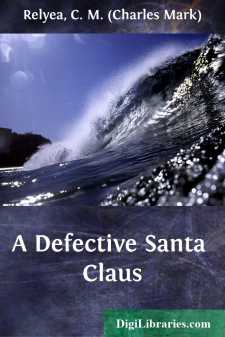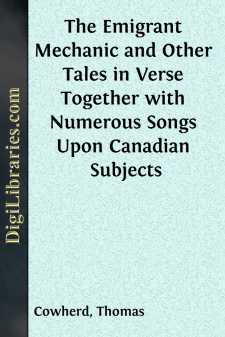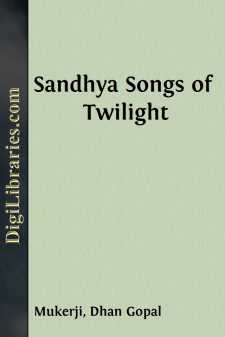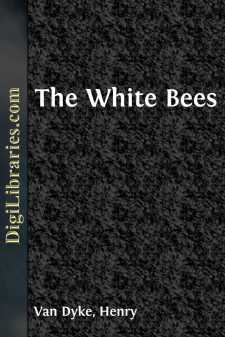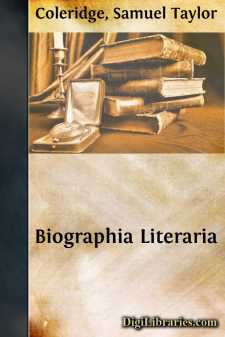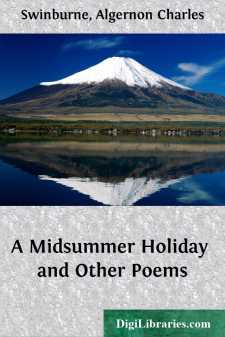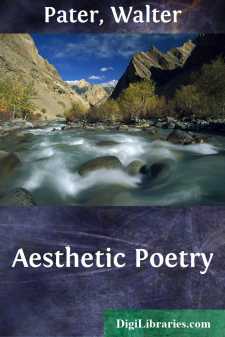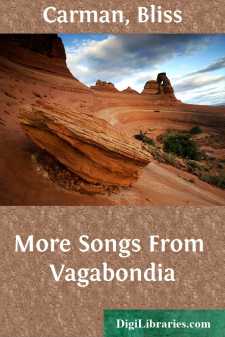Poetry Books
Sort by:
A Defective Santa Claus Allus when our Pa he's away Nen Uncle Sidney comes to stay At our house here—so Ma an' me An' Etty an' Lee-Bob won't be Afeard ef anything at night Might happen—like Ma says it might. (Ef Trip wuz big, I bet you he 'Uz best watch-dog you ever see!) An' so last winter—ist before It's go' be Chris'mus-Day,—w'y, shore...
more...
by:
Thomas Cowherd
William and AmeliaMy GardenThe Inebriate's Daughter's Appeal to her FatherTo the Children in Mrs. Day's SchoolSong to BrantfordTo Elihu BurrittTo a VioletEmma, the Tinker's DaughterTo my Father, supposed to be dyingOde to PeaceStanzas suggested by a Funeral ACROSTICS: I. To Mr. J. P——n, Missouri II. To my Eldest Son, in severe sickness III. A Tribute to the Memory...
more...
SYMBOLISMTongueless the bell!Lute without a song!It is not nightIt is God's dawn,Silence its unending song.Over heart's valley,In the soul's night,Through pain's windowBehold! His light!On Life's Height.No prayer, now,Though death-waves roll,Faith's candle lit,Beside it sits the soulReading Eternity's scroll. SOURCE OF SINGINGA bruised heart,A wounded soul,A broken...
more...
by:
Henry Van Dyke
LEGEND Long ago Apollo called to Aristaeus, youngest of the shepherds, Saying, "I will make you keeper of my bees." Golden were the hives, and golden was the honey; golden, too, the music, Where the honey-makers hummed among the trees. Happy Aristaeus loitered in the garden, wandered in the orchard, Careless and contented,...
more...
CHAPTER I Motives to the present work—Reception of the Author's first publication—Discipline of his taste at school—Effect of contemporary writers on youthful minds—Bowles's Sonnets—Comparison between the poets before and since Pope. It has been my lot to have had my name introduced both in conversation, and in print, more frequently than I find it easy to explain, whether I...
more...
THE SEABOARD.Thesea is at ebb, and the sound of her utmost wordIs soft as the least wave’s lapse in a still small reach.From bay into bay, on quest of a goal deferred,From headland ever to headland and breach to breachWhere earth gives ear to the message that all days preachWith changes of gladness and sadness that cheer and chide,The lone way lures me along by a chance untriedThat haply, if hope...
more...
by:
Robert Frost
Into My Own ONE of my wishes is that those dark trees,So old and firm they scarcely show the breeze,Were not, as 'twere, the merest mask of gloom,But stretched away unto the edge of doom.I should not be withheld but that some dayInto their vastness I should steal away,Fearless of ever finding open land,Or highway where the slow wheel pours the sand.I do not see why I should e'er turn back,Or...
more...
by:
Walter Pater
[213] THE "aesthetic" poetry is neither a mere reproduction of Greek or medieval poetry, nor only an idealisation of modern life and sentiment. The atmosphere on which its effect depends belongs to no simple form of poetry, no actual form of life. Greek poetry, medieval or modern poetry, projects, above the realities of its time, a world in which the forms of things are transfigured. Of that...
more...
by:
Vachel Lindsay
I [Bass drum beaten loudly.] Booth led boldly with his big bass drum— (Are you washed in the blood of the Lamb?) The Saints smiled gravely and they said: "He's come." (Are you washed in the blood of the Lamb?) Walking lepers followed, rank on rank, Lurching bravoes from the ditches dank, Drabs from the alleyways and drug fiends pale— Minds still...
more...
by:
Bliss Carman
JONGLEURS. What is the stir in the street?Hurry of feet!And after,A sound as of pipes and of tabers! Men of the conflicts and labors,Struggling and shifting and shoving,Pushing and pounding your neighbors,Fighting for leeway for laughter,Toiling for leisure for loving!Hark, through the window and up to the rafter,Madder and merrier,Deeper and verier,Sweeter, contrarier,Dafter and dafter,A song...
more...


